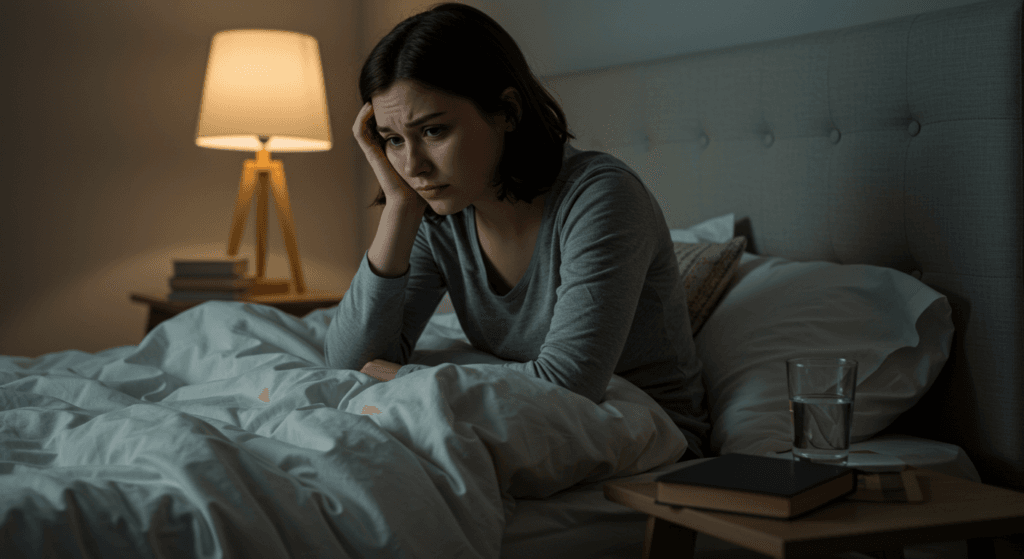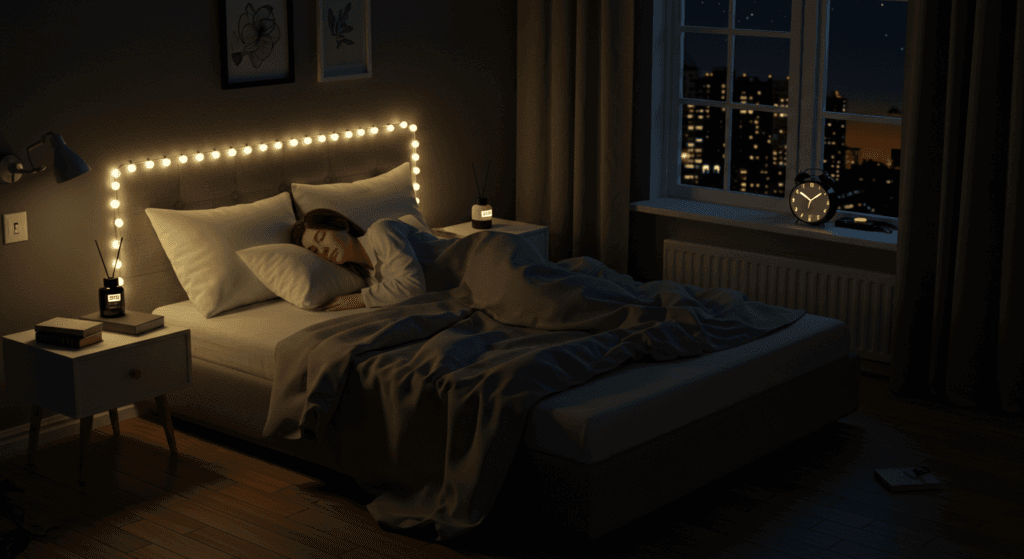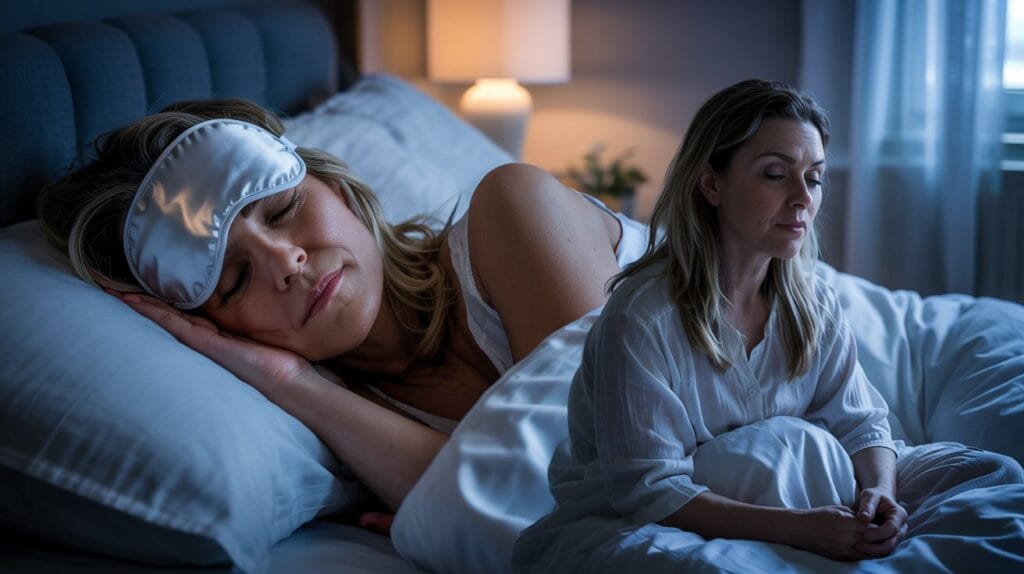
Ever wake up feeling like a zombie after a rough night? You know the drill—tossing and turning, staring at the ceiling, and counting down the hours until your alarm goes off. Insomnia can make it feel like you’re stuck in that cycle, and we’ve all been there.
But here’s the thing: you don’t have to rely on medication to get your sleep back on track. In this post, we’re diving into how to deal with insomnia without medication, sharing practical tips, and busting some sleep myths along the way. By the end, you’ll have a game plan to reclaim your rest and wake up feeling like a human again.
Why Sleep Matters (And Why Insomnia Sucks)
Let’s start with the basics: sleep is like your brain’s charger. Think of your brain as a phone battery—you can’t run on 10% forever without crashing. When we don’t get enough rest, everything feels harder. Concentration? Gone. Mood? All over the place. Energy? Forget about it.
Insomnia, or the inability to fall or stay asleep, can mess with every part of your life. But here’s the kicker: popping a pill isn’t always the answer. Sure, meds might help in the short term, but they don’t fix the root of the problem. Plus, they can come with side effects or even dependency issues.
So, what’s the deal? How can you deal with insomnia without medication? Let’s break it down.
What Causes Insomnia? The Common Culprits Behind Sleepless Nights
Insomnia doesn’t just happen out of nowhere. There are usually underlying reasons why sleep becomes a struggle. Identifying the underlying causes can help you tackle the issue efficiently. Here are the most common culprits:
1. Stress and Anxiety
Ever lay in bed replaying conversations, worrying about work, or overthinking life decisions? Stress and anxiety are major triggers of insomnia. When your brain is in overdrive, it releases cortisol (the stress hormone), keeping your body alert instead of relaxed.
Tip: Practicing relaxation techniques, such as journaling or deep breathing, before bed can help calm a racing mind.
2. Poor Sleep Habits
Your daily routines affect your ability to fall and stay asleep. If you have inconsistent sleep schedules, use electronics late at night, or nap too much during the day, your body’s internal clock gets thrown off.
Tip: Set a regular sleep routine by going to bed and waking up at the same time every day, even on weekends.
3. Caffeine and Stimulants
That afternoon coffee might be the reason you’re staring at the ceiling at midnight. Caffeine can stay in your system for up to 8 hours, making it harder for your body to wind down.
Tip: Cut off caffeine by 2 p.m. and switch to herbal tea in the evening.
4. Technology and Blue Light Exposure
Scrolling on your phone or watching TV before bed can suppress melatonin, the hormone responsible for making you sleepy. Blue light signals your brain to believe it’s still daylight.
Tip: Avoid screens at least an hour before bedtime, or use blue light filters if you must check your phone.
5. Underlying Health Conditions
Sometimes, insomnia is linked to medical conditions like chronic pain, acid reflux, restless leg syndrome, or even hormonal imbalances. If sleep problems persist despite making lifestyle changes, a doctor’s visit might be necessary.
Why Can’t I Sleep? Understanding What’s Keeping You Awake
If you’ve ever wondered why you can’t fall asleep even when you feel tired, here’s what might be happening:
1. Your Brain Is Too Active
When your mind is full of thoughts—whether it’s stress, excitement, or overthinking—it’s hard to switch off. Your brain needs time to transition from wakefulness to sleep.
Solution: Try a calming activity before bed, like reading or meditation, to signal your brain that it’s time to rest.
2. Your Sleep Cycle Is Off
Your body follows a circadian rhythm, a natural sleep-wake cycle regulated by light exposure. If you go to bed too late or sleep in too much, it can disrupt your rhythm.
Solution: Get sunlight exposure in the morning and avoid bright lights at night to help reset your internal clock.
3. You’re Not Producing Enough Melatonin
Melatonin is a hormone that helps regulate sleep. Certain habits, like using screens at night or having irregular sleep patterns, can interfere with its production.
Solution: Try dimming the lights in the evening and keeping a consistent bedtime routine to naturally boost melatonin levels.
4. Your Body Isn’t Ready for Sleep
If you’ve been sitting all day and haven’t burned much energy, your body might not feel the need to rest. On the flip side, exercising too close to bedtime can make you too energized to sleep.
Solution: Aim for moderate exercise during the day but avoid intense workouts at night.
5. Your Sleeping Environment Isn’t Ideal
Temperature, noise, light, and even an uncomfortable mattress can prevent quality sleep.
Solution: Make sure your bedroom is dark, quiet, and cool, and invest in comfortable bedding.
Create a Sleep-Friendly Environment
Your Bedroom Should Feel Like a Sleep Sanctuary
First things first: your bedroom matters. If your sleep space feels more like a chaotic storage room than a cozy retreat, it’s time for a makeover. Here’s how to turn your bedroom into a sleep haven:
- Keep it cool: Your body sleeps best in a slightly cooler room (around 60-67°F). Crack a window or turn down the thermostat.
- Block out light: Invest in blackout curtains or wear a sleep mask. Even a tiny bit of light can mess with your sleep hormones.
- Ditch the noise: If you live in a noisy area, try a white noise machine or a fan to drown out distractions.
Kick Your Phone Out of Bed
Here’s the thing: your phone is a sleep killer. The blue light from screens tricks your brain into thinking it’s daytime, making it harder to wind down. Try this:
- Set a screen curfew: Stop scrolling at least an hour before bed.
- Charge your phone elsewhere: Out of sight, out of mind.
Build a Relaxing Bedtime Routine
Wind Down Like a Pro
Your brain needs time to shift from “go mode” to “sleep mode.” A calming bedtime routine is like a signal to your body that it’s time to chill. Here are some ideas:
- Take a warm bath or shower: The drop in body temperature afterward can make you feel sleepy.
- Try gentle stretches or yoga: Focus on relaxing poses like child’s pose or legs-up-the-wall.
- Read a (boring) book: Skip the thrillers and opt for something soothing.
Avoid Sleep Saboteurs
Here’s the kicker: some of your favorite habits might be ruining your sleep. Watch out for these common culprits:
- Caffeine: That afternoon latte might still be in your system at bedtime. Cut off caffeine by 2 p.m.
- Alcohol: While it might make you feel drowsy, alcohol messes with your sleep cycle.
- Heavy meals: Eating a big dinner too close to bedtime can keep you awake.
Train Your Brain to Sleep Better
Stick to a Sleep Schedule
Your brain loves routine. Going to bed and waking up at the same time every day (yes, even on weekends) helps regulate your internal clock. Here’s how to make it work:
- Set a bedtime alarm: Just like a morning alarm, this reminds you when it’s time to start winding down.
- Be consistent: Even if you had a rough night, try to stick to your schedule.
Use Your Bed for Sleep Only
Here’s the thing: your brain associates your bed with whatever you do in it. If you work, watch TV, or scroll TikTok in bed, your brain starts to think it’s a place for activity, not rest. Try this:
- Use your bed just for sleeping and intimate moments.
- If you can’t sleep, get up: After 20 minutes of tossing and turning, move to another room and do something calming until you feel sleepy.
Manage Stress and Anxiety
Calm Your Racing Mind
Stress and anxiety are like fuel for insomnia. When your brain won’t stop buzzing, sleep feels impossible. Give these techniques a shot to relax your mind:
- Journal before bed: Write down your thoughts or make a to-do list for the next day.
- Practice mindfulness: Try a guided meditation or deep breathing exercises.
- Talk it out: Sometimes, sharing your worries with a friend or therapist can help.
Exercise (But Not Too Late)
Here’s the kicker: regular exercise can improve your sleep, but timing matters. Working out too close to bedtime can leave you too energized to sleep. Try to wrap up vigorous exercise at least 3 hours before bedtime.
Pro Tip: Gentle evening activities like walking or stretching can help you wind down without overstimulating your body.
FAQ
Takeaway
Dealing with insomnia without medication isn’t about quick fixes—it’s about creating habits that support your sleep. From setting up a sleep-friendly environment to managing stress, small changes can make a big difference.
If you found this article useful, share it with a friend and subscribe to our free newsletter at the bottom of the page so I can send you more sleep health tips.


